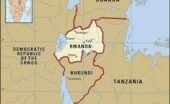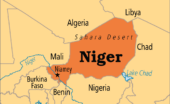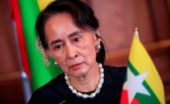Re Ian Bremmer 'Could third-party candidates upend the 2024 US election?' 3 April The current political movement in the USA…
Teaching the world to prevent genocide
Written by Diana Thebaud Nicholson // June 26, 2013 // Justice & Law // Comments Off on Teaching the world to prevent genocide
By Kyle Matthews and Zach Paikin
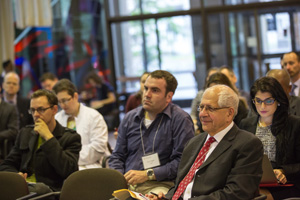 MIGS Director Frank Chalk (at right) listens to Senator and MIGS Distinguished Fellow Roméo Dallaire give an impassioned lecture.
MIGS Director Frank Chalk (at right) listens to Senator and MIGS Distinguished Fellow Roméo Dallaire give an impassioned lecture.| All photos by Concordia University
(Concordia Now) The global movement to protect populations from mass atrocities is at a major crossroad. The successful invocation of the Responsibility to Protect (R2P) doctrine in Libya contrasts with the stunning failure of the international community to stop the carnage in Syria. Shifting geopolitical power is making it more difficult for the world to agree on when to intervene. New technologies — military and civilian — are altering the battlefield completely.
At this point in time, states — who are the primary actors in the global system and therefore the ultimate decision-makers — must know that taking action to prevent mass atrocities is very much in their interest.
This is why the Montreal Institute for Genocide and Human Rights Studies (MIGS) decided to hold the world’s first professional training program from June 11 to 13. States must be informed actively and knowledgeably that preventing mass atrocities is in their interest.
MIGS’ training program featured more than a dozen speakers well versed in the topic of mass-atrocity prevention as well as more than 40 participants from professional backgrounds, spread out over three days.
Senator and MIGS Distinguished Fellow Roméo Dallaire, who led a grossly undermanned United Nations mission in Rwanda during its 1994 genocide, opened the day’s proceedings with a comprehensive talk about changing global dynamics. Preventing genocide must be an “engagement of humanity,” he declared, but “we’re stumbling into a new era with old tools.”
Senator Dallaire’s talk provided a timely introduction to the day’s activities, as the participants learned about the R2P doctrine — the international norm adopted by the United Nations in 2005 designed to enforce the Genocide Convention that came into force after the Second World War — in the sessions that followed.
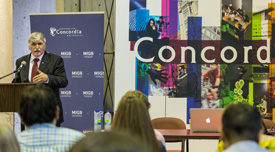
| Photo by Concordia University
Currently, humanitarians are dealing with a clear-cut example of having to address a contemporary problem with outdated institutions. As pointed out during the panel on genocide’s position in international law, the UN were designed to operate under a framework of primarily ensuring collective security, not human rights. Providing a veto to every Security Council member was intended to allow for proactive military action only when all the world’s major powers agreed.
Still, this is not to say that there aren’t tools presently at our disposal. The National Post’s Jonathan Kay and Liberal MP/human-rights advocate Irwin Cotler reminded the crowd that mobilizing public opinion, remembering past genocides and condemning state-sanctioned cultures of hate will serve to remind governments that action to prevent mass atrocities is a must.
Regarding the genocides in Rwanda and Darfur, “no one can say that we did not know” about them as they were taking place, Cotler pointed out. “We knew, and we did not act.”
The case for prevention is further strengthened when one examines the universally threatening consequences of mass atrocities: the creation of safe havens for terrorists, cross-border violence spillovers and the spread of disease in a globalized world.
The conference’s participants included representatives from the United States Agency for International Development, the UN, Médecins Sans Frontières, the Nobel Women’s Initiative and the Australian Red Cross, among others. They will continue interacting with one another in an online forum designed to further the discussion.
This professional training program organized by MIGS — having generated a new community of commitment — has sent, and will continue to send, a strong message to elected officials in Canada and across the world: Being a bystander to mass atrocities is no longer an option.
Kyle Matthews is senior deputy director of the Will to Intervene Project at the Montreal Institute for Genocide and Human Rights Studies; Zach Paikin is a Canadian political commentator

